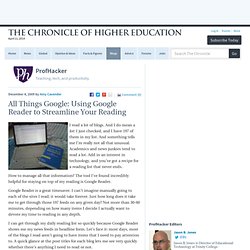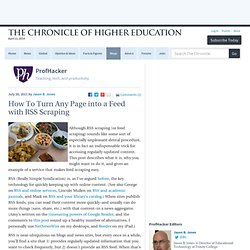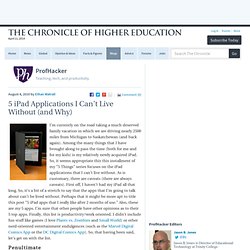

Toward an Understanding of Our Current Predicaments. Introduction to Artificial Intelligence - Fall 2011. ProfHacker. I read a lot of blogs.

And I do mean a lot: I just checked, and I have 197 of them in my list. And something tells me I’m really not all that unusual. Academics and news junkies tend to read a lot. Add in an interest in technology, and you’ve got a recipe for a reading list that never ends. How to manage all that information? Google Reader is a great timesaver. I can get through my daily reading list so quickly because Google Reader shows me my news feeds in headline form. If there is something I think I should read, I need only click on the post title, and it opens in the same window. If there’s something I want to read but that I don’t have time for when I’m plowing through my reading list, I can use the FireFox extension from Read it Later to add the item to my Read it Later list.
Though most of my blog reading is simply for interest’s sake, a good chunk of it relates to my job and/or my academic interests. Is Google Reader in your toolbox? How To Turn Any Page into a Feed with RSS Scraping. Although RSS scraping (or feed scraping) sounds like some sort of especially unpleasant dental procedure, it is in fact an indispensable trick for accessing regularly-updated content.

This post describes what it is, why you might want to do it, and gives an example of a service that makes feed scraping easy. RSS (Really Simple Syndication) is, as I’ve argued before, the key technology for quickly keeping up with online content. (See also George on RSS and online services, Lincoln Mullen on RSS and academic journals, and Mark on RSS and your library’s catalog.) When sites publish RSS feeds, you can read their content more quickly–and usually can do more things (save, share, etc.) with that content–in a news aggregator. (Amy’s written on the timesaving powers of Google Reader, and the comments to this post round up a healthy number of alternatives. Best of all, feed scraping is pretty easy to do. In the rest of the post, I’m going to show how this works. Click for full-size. ProfHacker. I’m currently on the road taking a much deserved family vacation in which we are driving nearly 2500 miles from Michigan to Saskatchewan (and back again).

Among the many things that I have brought along to pass the time (both for me and for my kids) is my relatively newly acquired iPad. So, it seems appropriate this this installment of my “5 Things” series focuses on the iPad applications that I can’t live without. As is customary, there are caveats (there are always caveats). First off, I haven’t had my iPad all that long. So, it’s a bit of a stretch to say that the apps that I’m going to talk about can’t be lived without. Penultimate One of the things that the iPad does really well is take notes. GoodReader Every iPad owner needs a powerfile file viewer. Things I’ve written about the desktop version of Things in a previous “5 Things” post. As much as I love Things (and I love it a lot), its got one glaring problem: price.
Pulse News Reader Backgrounder. ProfHacker. You run a search for articles in your favorite digital journal database. Yeah, all the big hitters are there; lots of heavyweight authors and Brilliant™ ideas. Hmm, looks like the topic you’re dealing with is uncharted territory, or less generously, so obscure that no one else thought it worth writing about. You broaden your search to a few other—not so favorite—databases of journals and then try that fancy new cross-database search system the university offered but it still turns up nothing helpful. Then you turn to Google Scholar and find that, though you have to wade through a sea of irrelevant articles from academic fields you can never seem to filter out properly with advanced search, you actually find a dozen articles directly related to your topic.
Clicking through you find six of them are in journals your institution doesn’t subscribe to, or at least not for the dates concerned. You skim these remaining half dozen articles.